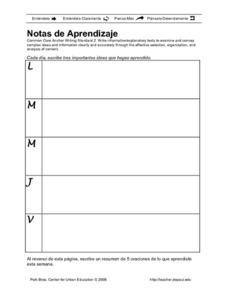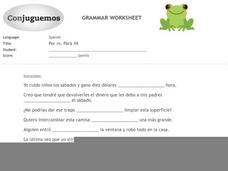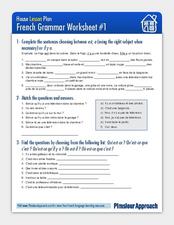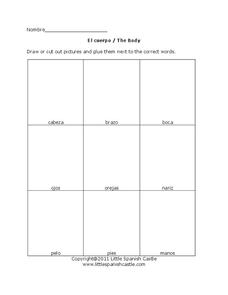Curated OER
Notas de Aprendizaje
What was the most important thing you learned today? Print this graphic organizer and distribute it to your class. They don't have to limit their notes to your class alone (unless directed), but each day, they write down three important...
Curated OER
Tú eres el Astrónomo
Aligned with the Common Core State Standards for writing, this resource has Spanish language learners take on the role of an astronomer. After they use the graphic organizer to list names, verbs, and adjectives related to astronomy, they...
Curated OER
Adjectives-Nouns #3
Hola Marta! Start by reading the short letter to Marta. Then, using the adjectives and nouns in parentheses, complete the 10 blank spaces in the paragraph. Make sure the adjectives match their nouns! Consider using this short activity as...
Curated OER
¿Por qué es importante el Servicio Comunitario?
Why is it important to do community service? Read these paragraphs to discover Barack Obama and Joe Biden's stance on community service. After reading the difficult text, high schoolers must identify the principal idea and decide their...
Curated OER
Como Resumir
Improve the reading ability of your intermediate and advanced Spanish speakers. As they read, they record 10 words they deem important to the text. Then, they summarize the main points, and finally they write an entire paragraph...
Curated OER
It's Time to Practice!
Telling time is easy, but if you're learning how to tell time in another language, it can be a tough adjustment! Give your middle and high school beginners this two-page worksheet to review time related vocabulary.
Curated OER
Tú eres el Líder
Start by having your class list words (specifically names, verbs, and adjectives) that would be necessary to know if you worked for the government. Then, using their lists, they create a story and/or write a speech that uses this...
Curated OER
Banco de Palabras de Contenido
Grappling with words in context helps learners build vocabulary skills. As your Spanish class is reading new Spanish literature, have them complete this graphic organizer. They record new vocabulary words and use the context to define...
Curated OER
Mapa de la historia
Is your advanced Spanish class reading Spanish literature? Give them this graphic organizer to help them sift through the story. Where does it take place? When? What happens in the story?
Curated OER
Verbos/ Verbs
They say you only know a language when you can conjugate the 500 most common verbs used in that language. Provide a copy of this sheet to each of your beginning class members, and see how many Spanish verbs they can match with their...
Curated OER
Direct and Indirect Object Pronouns #3
Using direct and indirect object pronouns in the same sentence can be tricky! Beginning to intermediate Spanish speakers read the following sentences and translate them into English. The first one is done for them. Consider also having...
Curated OER
Preterite vs. Imperfect #10
Compile a packet of practice worksheets for your beginning Spanish speakers learning about expressing actions in the past tense and using preterite verbs. Simply search more worksheets for preterite and imperfect tenses to add resources!
Curated OER
Preterite vs. Imperfect #6
Now that your class has mastered the preterite tense, introduce the imperfect tense. Give them a verb conjugation chart to help them complete this short exercise. There are -ar, -ir, and common verbs to conjugate.
Curated OER
Direct and Indirect Object Pronouns #1
Review direct and indirect object pronouns with this practice activity. Sure, it's easy to use one or the other, but can your beginning Spanish language learners use both in sentence correctly? Give them this informal assessment to find...
Curated OER
Ser vs. Estar #1
What are the differences between ser and estar? Start by discussing the differences, showing your class how to conjugate each, and doing some examples together. Then, give them some practice!
Curated OER
Future Tense: Regular and Irregular Verbs #1
The next tense your class must master: the future tense! Use this simple worksheet as an exit ticket out of class. After introducing the future tense and how it's conjugated, provide your class with this activity to assess their...
Curated OER
Por vs. Para #4
The Spanish words por and para are very similar, can you learners distinguish between the two? Use this short, 10-question exercise to find out! This is the fourth worksheet in a series to develop an understanding between the two target...
Curated OER
Present Tense: All Verbs #3
Study verb conjugations to learn Spanish! Beginning Spanish readers complete this short exercise to build verb awareness. There are 15 blanks to fill, and learners must conjugate the -ir, -er, and -ar verbs in parentheses.
Curated OER
Present Irregular
It's tough to remember irregular verb conjugations! Provide this extra practice for your beginning classes. The 32 sentences are in Spanish, and they must find the correct English translation. Questions are provided in the...
Curated OER
Idioms with vez
Knowing idiomatic phrases gives learners a better idea of a language and its people. Introduce your scholars to idioms using the word vez. Answers are provided, but be sure to discuss some of the more difficult ones with your class!
Curated OER
House Lesson Plan: French Grammar Worksheet
How do you formulate questions in French? This grammar worksheet focuses on basic question words as well as the words est, a, and il y a. There are five short exercises to help your intermediate French speakers build familiarity with the...
Curated OER
French Phrases: Ways to Ask
If you're teaching interrogatives in French, this 10-question worksheet may be useful. It asks class members to translate the French phrases into English. An example phrase is, je voudrais.
Curated OER
Essential Questions
How are you? First, learners have to translate the seven questions (currently in English) into Spanish, and then they have to answer them! Consider pairing learners up to practice asking and answering questions.
Curated OER
El cuerpo/ The Body
What does cabeza mean? Pelo? Teach your young, beginning Spanish speakers the parts of the body. They review their new vocabulary terms by drawing (or pasting pictures) of nine body parts.

























